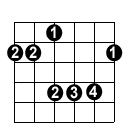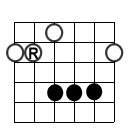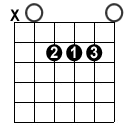How To Play Arpeggios On Guitar
Picked As Individual Notes
As stated above, arpeggios may contain the same notes as their chord counterparts, but they are played a totally different way. They must be picked as individual notes. You don't want the notes to ring together, you want them ring out separately-one note at a time. You can hear exactly what we mean in the audio examples with each arpeggio pattern.
Fingerings
The most important thing to pay attention to when learning these patterns is your fingerings. Each pattern presented will show you the correct fingering to use. In the diagram below is an arpeggio form. Notice the fingerings labeled in the black dots.

Some of the fingerings may seem a little strange and difficult at first, but keeping to the suggested fingerings is important because they will help you develop speed when playing the patterns.
CAGED Chord Pattern Highlight
Each arpeggio has two diagrams. The first one shows the fingerings as previously stated. The second picture for each arpeggio shows the root and highlights the CAGED chord pattern that the arpeggio is extracted from. Look at the example below:


The arpeggio pattern above is an A major arpeggio pattern. If you look at the CAGED chord pattern highlight in the second picture above you can see the A major chord finger pattern highlighted in black. Can you see the similarities with the chord form below?

Using The Root
The root of the arpeggio is the primary note you will use to identify the arpeggio's name. In each arpeggio pattern, the name of the note of the fret that the root falls on is the name of the arpeggio. The root will be marked by an "R" like in the diagram below.

Playing this arpeggio so that the root falls on the 5th fret it would be a D major arpeggio because the 5th fret of the 5th string (where the root falls) is D. Most arpeggios have a 6th, 5th, or 4th string root, so being able to identify notes on these strings is important. If you can't, then head over to Guitar 101 and work with some of the note memorizing exercises.
Tablature Example
Included with each arpeggio pattern is a random tablature example like in the A major arpeggio pattern example below:

In case you're wondering, it's a F#/Gb arpeggio because the root falls on the 9th fret of the 5th string which is F#/GB
Practice Practice Practice
Every arpeggio pattern you could ever want to play can be found in the column on the left. Remember to start with the major, minor and dominant patterns because they are the most commonly used. It may take you hours and hours of practice before you master these, but it's well worth it as you will find yourself using them time and time again.

